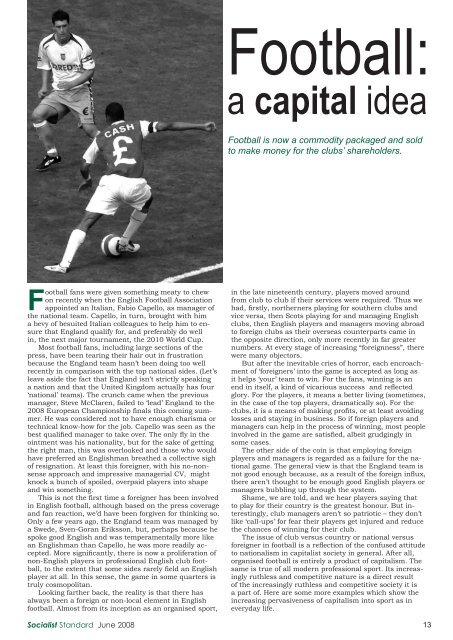Socialist Standard June 2008 - World Socialist Movement
Socialist Standard June 2008 - World Socialist Movement
Socialist Standard June 2008 - World Socialist Movement
You also want an ePaper? Increase the reach of your titles
YUMPU automatically turns print PDFs into web optimized ePapers that Google loves.
Football:<br />
a capital idea<br />
Football is now a commodity packaged and sold<br />
to make money for the clubs’ shareholders.<br />
Football fans were given something meaty to chew<br />
on recently when the English Football Association<br />
appointed an Italian, Fabio Capello, as manager of<br />
the national team. Capello, in turn, brought with him<br />
a bevy of besuited Italian colleagues to help him to ensure<br />
that England qualify for, and preferably do well<br />
in, the next major tournament, the 2010 <strong>World</strong> Cup.<br />
Most football fans, including large sections of the<br />
press, have been tearing their hair out in frustration<br />
because the England team hasn’t been doing too well<br />
recently in comparison with the top national sides. (Let’s<br />
leave aside the fact that England isn’t strictly speaking<br />
a nation and that the United Kingdom actually has four<br />
‘national’ teams). The crunch came when the previous<br />
manager, Steve McClaren, failed to ‘lead’ England to the<br />
<strong>2008</strong> European Championship finals this coming summer.<br />
He was considered not to have enough charisma or<br />
technical know-how for the job. Capello was seen as the<br />
best qualified manager to take over. The only fly in the<br />
ointment was his nationality, but for the sake of getting<br />
the right man, this was overlooked and those who would<br />
have preferred an Englishman breathed a collective sigh<br />
of resignation. At least this foreigner, with his no-nonsense<br />
approach and impressive managerial CV, might<br />
knock a bunch of spoiled, overpaid players into shape<br />
and win something.<br />
This is not the first time a foreigner has been involved<br />
in English football, although based on the press coverage<br />
and fan reaction, we’d have been forgiven for thinking so.<br />
Only a few years ago, the England team was managed by<br />
a Swede, Sven-Goran Eriksson, but, perhaps because he<br />
spoke good English and was temperamentally more like<br />
an Englishman than Capello, he was more readily accepted.<br />
More significantly, there is now a proliferation of<br />
non-English players in professional English club football,<br />
to the extent that some sides rarely field an English<br />
player at all. In this sense, the game in some quarters is<br />
truly cosmopolitan.<br />
Looking farther back, the reality is that there has<br />
always been a foreign or non-local element in English<br />
football. Almost from its inception as an organised sport,<br />
<strong>Socialist</strong> <strong>Standard</strong> <strong>June</strong> <strong>2008</strong><br />
in the late nineteenth century, players moved around<br />
from club to club if their services were required. Thus we<br />
had, firstly, northerners playing for southern clubs and<br />
vice versa, then Scots playing for and managing English<br />
clubs, then English players and managers moving abroad<br />
to foreign clubs as their overseas counterparts came in<br />
the opposite direction, only more recently in far greater<br />
numbers. At every stage of increasing “foreignness”, there<br />
were many objectors.<br />
But after the inevitable cries of horror, each encroachment<br />
of ‘foreigners’ into the game is accepted as long as<br />
it helps ‘your’ team to win. For the fans, winning is an<br />
end in itself, a kind of vicarious success and reflected<br />
glory. For the players, it means a better living (sometimes,<br />
in the case of the top players, dramatically so). For the<br />
clubs, it is a means of making profits, or at least avoiding<br />
losses and staying in business. So if foreign players and<br />
managers can help in the process of winning, most people<br />
involved in the game are satisfied, albeit grudgingly in<br />
some cases.<br />
The other side of the coin is that employing foreign<br />
players and managers is regarded as a failure for the national<br />
game. The general view is that the England team is<br />
not good enough because, as a result of the foreign influx,<br />
there aren’t thought to be enough good English players or<br />
managers bubbling up through the system.<br />
Shame, we are told, and we hear players saying that<br />
to play for their country is the greatest honour. But interestingly,<br />
club managers aren’t so patriotic – they don’t<br />
like ‘call-ups’ for fear their players get injured and reduce<br />
the chances of winning for their club.<br />
The issue of club versus country or national versus<br />
foreigner in football is a reflection of the confused attitude<br />
to nationalism in capitalist society in general. After all,<br />
organised football is entirely a product of capitalism. The<br />
same is true of all modern professional sport. Its increasingly<br />
ruthless and competitive nature is a direct result<br />
of the increasingly ruthless and competitive society it is<br />
a part of. Here are some more examples which show the<br />
increasing pervasiveness of capitalism into sport as in<br />
everyday life.<br />
13<br />
<strong>June</strong> 08.indd 13 20/5/08 10:39:42






